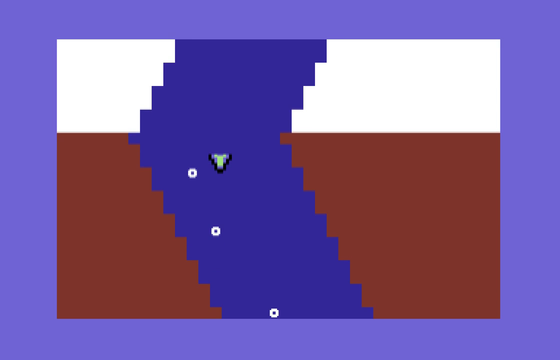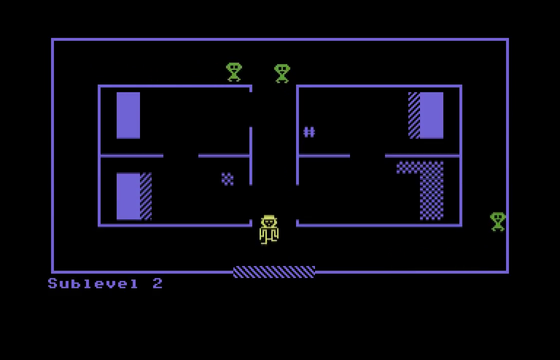Part 29: ManxomeBromide - The Competition: Games from Family Computing
Let's Play the competition: Let's type shit in from Family Computing!I have a confession to make: I did not get a subscription to Compute! until the early 1990s, when the Gazette was an optional pack-in (that we didn't get), MLX was only available by mail-order anyway, and it was mostly a software review magazine for DOS and Windows users. Instead, as a youth, we subscribed to Scholastic's competing magazine, Family Computing. Scholastic actually ran direct sales of their books and magazines through our elementary school, which is probably how we ran into it.
Where Compute! focused on actually giving you access to truly useful utilities and worthwhile games and such, Family Computing was much more intended as instructional or as something to keep the kids busy instead of TV. Programs were much shorter and much simpler, and they usually weren't arcade style games.
They also were shorter because they'd usually have listings for a solid half-dozen platforms, not just Commodore machines. This also led to some interesting "house style" features. For instance, there were no unprintable characters in the listings. Where Compute! would write a command like 10 PRINT "{clr}[< 7 >]", and the Commodore manuals would actually print the reverse-video heart and diamond that appeared on the screen when you did this, Family Computing's listings would instead insist on 10 PRINT CHR$(147);CHR$(154). This constrained the amount of work that could be done per column inch even further.
As a result, I'm covering three programs in this update's video to get its length up to snuff.
Space Race
Family Computing, June 1987, Issue #46, Volume 5, No. 6
This is a fairly straightforward game in which you fly a spaceship through a tunnel without crashing into mines or walls. If you crash, you get points based on how far you flew. If you don't crash, you reach the end of the course, get ten times as many points as you otherwise would have for flying that far, and reset to a newer, longer course.

This is a really smooth Flappy Bird style play experience for a comically small amount of code. This was 75 lines of BASIC code, and it took less than ten minutes to type in and debug. As anyone else who's dived into this code can tell you, that is hilariously short. The worst I can say about this code is that it's not super-transparent what it's doing, but even then, it's not obfuscated, and the modest pile of DATA statements at the end are there just to define the sprites.
Oh right, it also fit sprites, default character graphics, and sound into this at modest action-game speeds in those 75 lines. In terms of fun per unit of typing effort, this is firmly in the head of the pack.
Spy Music
July 1986, Volume 4, No. 7
This is more typical of what type-ins from Family Computing looked like, in that you type it in and it plays a little song. This one is somewhat more dignified than On Top of Spaghetti or similar fare, which it tended to prefer. And it provides us a fine lead-in to the main reason I did this post...
Doors
Family Computing, November 1986, Volume 4, No. 11
Joey Latimer posted:
When the D.A. handed you the job, you knew it wouldn't be easy to find evidence proving that giant Geothermal, Inc. is fronting for an international spy ring. To get the evidence, you knew you had to go to the source: Geothermal Headquarters itself. Getting there was easy—the trouble began when you tried to get inside.
Telling the robot at the front gate that you had a search warrant got the engine ripped out of your car. So you took what you thought was the path of least resistance and entered the building by crawling through an air-conditioning vent. So far, so good, but when you tried getting past the alarm system, you blew it. The wrong wires touched together, and everything went fireworks. Now you're trapped in Geothermal Headquarters: a three-story building where killer security droids pace the halls, doors open and close without warning, electrified walls and furniture surround you, and booby-traps appear out of nowhere. The only way to get out is via the elevator, but you need to find a special pass-key before you can leave the building. You also have to find the evidence you came for, or you'll lose your job.
...
If you make it out alive, your total time will be displayed. (If you don't, the D.A. insists you'll never work again—an understatement if I ever heard one!)
Doors was an intimidatingly huge program that I never did type in as a youth. It was way too big, it was almost all inscrutable DATA statements, it was a hybrid of BASIC and machine language that I couldn't even dimly comprehend at the time and didn't want to mess with, and Family Computing did not have an automatic proofreader like Compute! did. The notion of such a proofreader program never actually entered my young mind, so this was just a daunting challenge, that daunted me until the magazine itself was long-lost.
It's time to make good on an old debt. Like I said earlier in the thread, if you're going to revisit your childhood, you should bring a gift for your gracious host.

3 screens of map to explore, killer robots on patrol, and some genuinely random death, as promised.
The Good: This is the only program I've seen from Family Computing that approaches Gazette quality. The control system is neat too, where you search in directions and this has a graphic, which means you can make your dude do a little dance. Had I, at the time, actually successfully typed this in, I would have indeed been blown away by how much great stuff it did, but frustrated because I'd have no way of figuring out how it did it.
The Bad: "Approaches" isn't "achieves". The trapdoors don't seem to work, and the "random" boobytraps are complete BS. Sprites aren't turned off when they should be. This all lends the program a haphazard feel that leans more more Skydiver than Astro-PANIC. The code is also simply bad, to my older and more discriminating eyes, and as more recently trained on the Gazette's own hybrid BASIC-Machine Language programs. Instead of setting up a frame update trap like a civilized game loop, the BASIC code SYSes out to the machine code to update the droids and player every few statements to keep things rolling. When I pointed VICE's disassembler at the machine code, that was also terrible; there were things like five or more almost-identical copies of code that could have trivially been turned into a loop and noticeably lowered the number of DATA statements. The internal data consistency checker wasn't actually good enough to catch any of the several errors I made typing this in, either, and it could have by only adding two more arithmetic operations in one subroutine.
Doors actually is the single largest program posted to this thread right now, just barely edging out Hex War. This is mostly because DATA statements are incredibly wasteful of disk space.
The weird: Scholastic was way classier about this stuff since they were marketing to nervous 1980s parents. Nothing I found in these issues is worth calling out as baffling.
Disk update
The SA Gazette disk will be updated soon with all these programs; a number of already-posted programs by others are on their way to me and I want to save myself some trouble and just deal with it all at once. If you have typed in a program for this thread and haven't contacted me about it, shoot me a PM or post a link to it. In accordance with the OP's wishes, this should be something like Dropbox or a personal space and not something hideously dodgy.